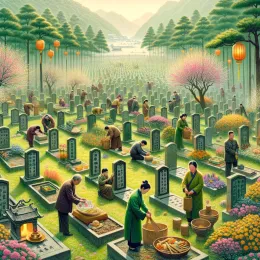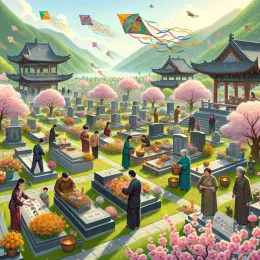





Create a card or greeting about Qingming Festival China with AI

Please wait 10–15 seconds while we create your unique greeting. This process ensures full personalization just for you! Do not leave or reload the page to avoid losing progress. Thank you for your patience!
Qingming Festival: A Celebration of Ancestors and Nature
The Qingming Festival, also known as Tomb-Sweeping Day, is a significant traditional holiday in China that honors ancestors and celebrates the arrival of spring. This festival, observed on the 104th day after the winter solstice, usually falls on April 4th or 5th. It is a time for families to come together, pay respects to their ancestors, and enjoy the beauty of nature as it awakens from winter.
During this period, many Chinese people travel to their ancestral graves to perform rituals, which include cleaning the tombstones, making offerings, and burning incense. This act of remembrance is essential for maintaining familial bonds and honoring the legacy of those who came before. The festival is not only a somber occasion but also a celebration of life, as it coincides with the blooming of flowers and the renewal of the earth.
Historical Significance
The origins of the Qingming Festival can be traced back over 2,500 years to the Cold Food Festival, which commemorated the death of a nobleman named Jie Zitui. According to legend, Jie Zitui died in a fire while trying to protect his lord. To honor his memory, people began to refrain from cooking on that day, instead eating cold food. Over time, this evolved into the Qingming Festival, incorporating tomb-sweeping traditions.
As the festival evolved, it became a time not only to remember the dead but also to celebrate the beauty of nature. It reflects the deep-rooted cultural values of filial piety and respect for ancestors, which are central to Chinese society.
Customs and Traditions
The Qingming Festival is rich in customs that vary across different regions of China. Some of the most common practices include:
- Tomb Sweeping: Families visit the graves of their ancestors, clean the tombstones, and make offerings such as food, flowers, and incense.
- Burning Paper Money: To provide for the deceased in the afterlife, families burn paper money and other symbolic items.
- Spring Outings: Many people take advantage of the holiday to enjoy outdoor activities, such as picnics and kite flying, symbolizing the arrival of spring.
- Planting Trees: Some families choose to plant trees during this time, promoting environmental awareness and the cycle of life.
Tomb Sweeping Rituals
When visiting the graves, families often bring specific items to honor their ancestors. These items typically include:
- Fresh flowers, representing beauty and life.
- Fruits and favorite foods of the deceased.
- Incense sticks, which are burned to create a connection between the living and the spirit world.
- Paper money and other offerings, which are burned to ensure the deceased have resources in the afterlife.
The act of cleaning the tombstone is a physical manifestation of respect and care, symbolizing the ongoing relationship between the living and the dead.
Regional Variations
While the core traditions of the Qingming Festival remain consistent, different regions in China have unique customs that reflect local cultures and practices. For instance:
- In northern China, people often eat a special pastry called “Qingming cake,” made from glutinous rice and filled with various ingredients.
- In southern regions, it is common to fly kites during the festival, with some even attaching small lanterns to them to symbolize sending messages to the heavens.
- In some areas, people participate in dragon and lion dances, adding a festive atmosphere to the solemn occasion.
Modern Celebrations
In contemporary China, the Qingming Festival has adapted to changing times while maintaining its core values. Urbanization and modernization have influenced how people observe the festival. Many individuals may not be able to visit ancestral graves in person due to distance or other commitments. Consequently, some families turn to online platforms to perform virtual tomb-sweeping ceremonies.
Additionally, the festival has become a time for family reunions, where relatives gather to share meals and reminisce about their loved ones. This modern interpretation emphasizes the importance of family connections and the collective memory of ancestors.
Environmental Awareness
The Qingming Festival also serves as a reminder of the importance of nature and environmental stewardship. As families engage in outdoor activities, the festival promotes appreciation for the changing seasons and the beauty of the natural world. Many communities organize tree-planting events and clean-up activities to encourage environmental responsibility.
This connection to nature is particularly significant as it aligns with traditional Chinese philosophies that emphasize harmony between humans and the environment. The celebration of life during Qingming is not only about honoring ancestors but also about ensuring a sustainable future for generations to come.
Qingming Festival Around the World
As Chinese communities have spread across the globe, the Qingming Festival has also found its way to other countries. In places with significant Chinese populations, such as Singapore, Malaysia, and the United States, the festival is celebrated with similar customs, including tomb-sweeping and family gatherings.
In these regions, the festival often highlights the importance of cultural heritage and the role of the Chinese diaspora in preserving traditions. Local variations may emerge, influenced by the cultural contexts of the host countries, yet the essence of honoring ancestors remains intact.
Conclusion
The Qingming Festival is a profound expression of respect for ancestors and a celebration of life and nature. It encapsulates the values of filial piety, family unity, and environmental awareness. As the festival continues to evolve, it retains its significance in modern society, reminding individuals of their roots while encouraging them to cherish the present.
Whether through traditional rituals or contemporary practices, the spirit of Qingming endures, bridging the past and the future in a harmonious celebration of life.
Wishes for Other Holidays

Best Examples of wishes


FAQ

Interesting Articles and Tips for holidays and wishes
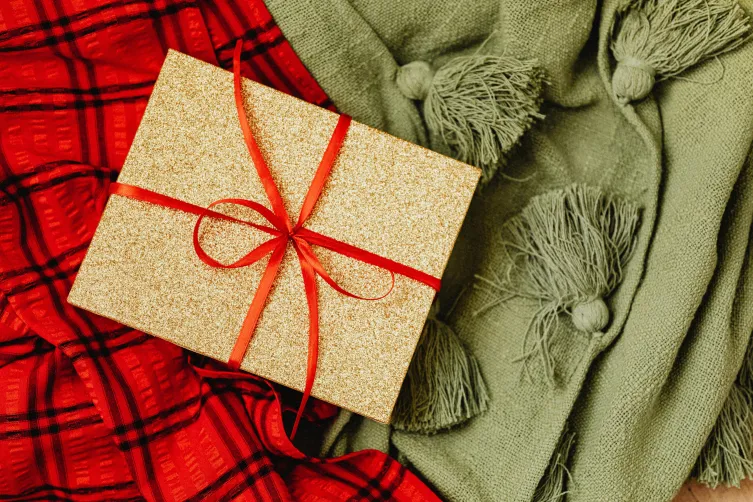
How to Make Digital Invitations for Your Next Party
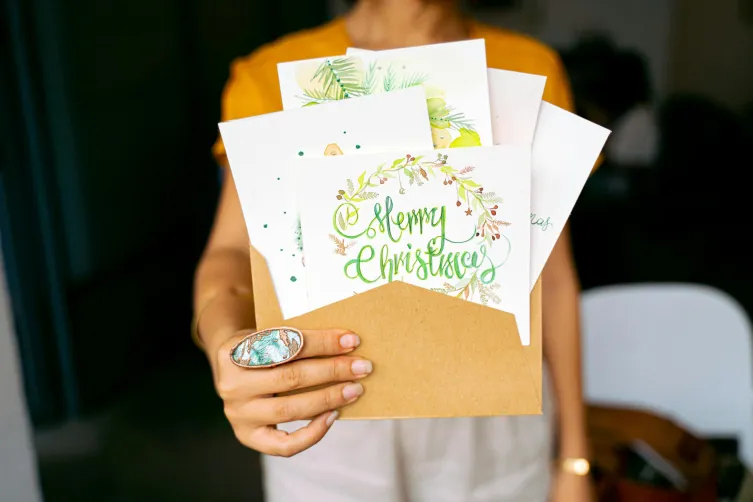
Top Tips for Creating Personalized Greeting Cards Online

Best Wishes: Crafting Unique Birthday Greetings Easily
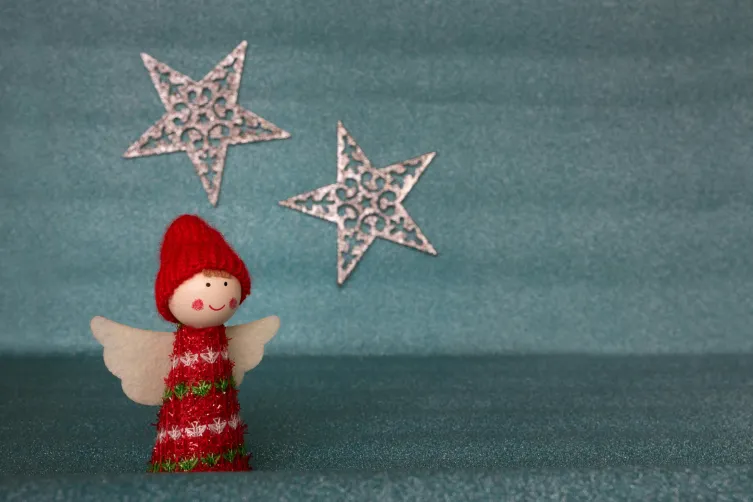
Why AI Enhances Creativity in Writing Holiday Greetings
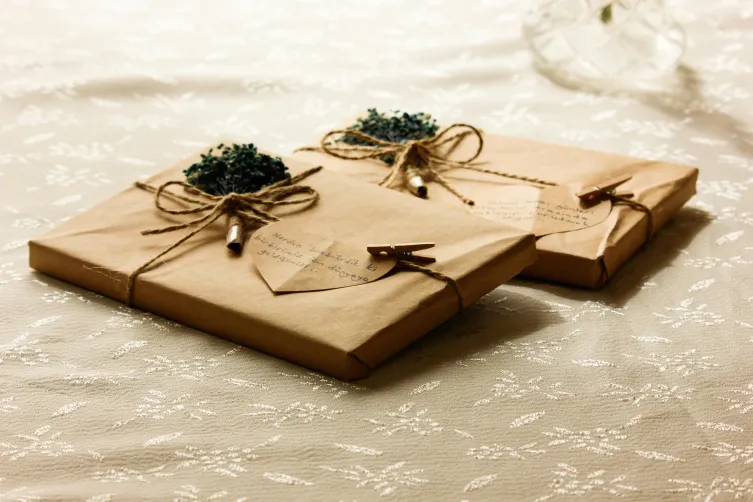
Celebrate Milestones with AI-Powered Congratulation Cards


Ваш отзыв добавлен!





